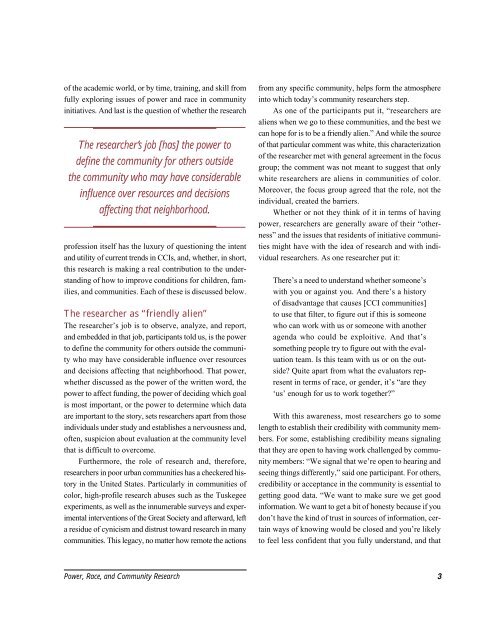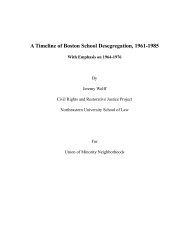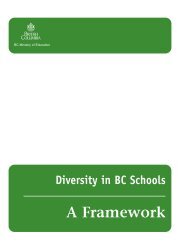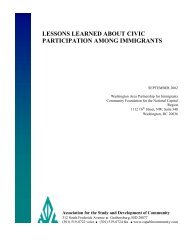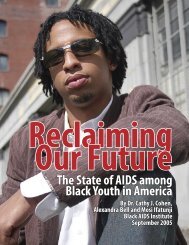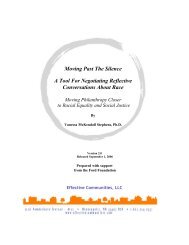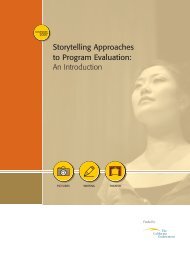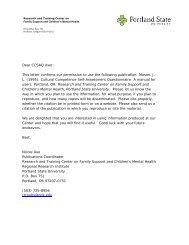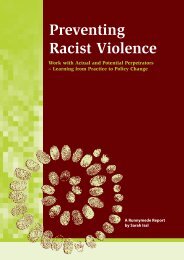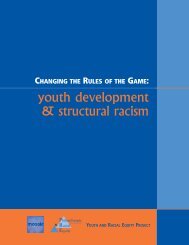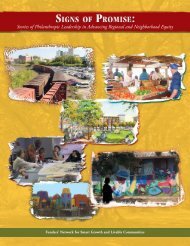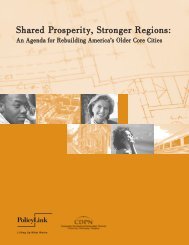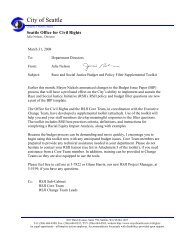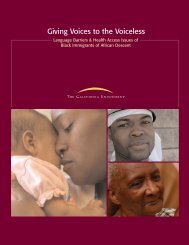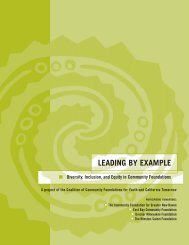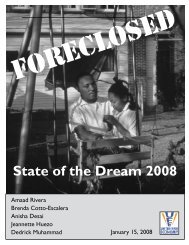Core Issues in Comprehensive Community-Building Initiatives ...
Core Issues in Comprehensive Community-Building Initiatives ...
Core Issues in Comprehensive Community-Building Initiatives ...
You also want an ePaper? Increase the reach of your titles
YUMPU automatically turns print PDFs into web optimized ePapers that Google loves.
of the academic world, or by time, tra<strong>in</strong><strong>in</strong>g, and skill from<br />
fully explor<strong>in</strong>g issues of power and race <strong>in</strong> community<br />
<strong>in</strong>itiatives. And last is the question of whether the research<br />
The researcher’s job [has] the power to<br />
def<strong>in</strong>e the community for others outside<br />
the community who may have considerable<br />
<strong>in</strong>fluence over resources and decisions<br />
affect<strong>in</strong>g that neighborhood.<br />
profession itself has the luxury of question<strong>in</strong>g the <strong>in</strong>tent<br />
and utility of current trends <strong>in</strong> CCIs, and, whether, <strong>in</strong> short,<br />
this research is mak<strong>in</strong>g a real contribution to the understand<strong>in</strong>g<br />
of how to improve conditions for children, families,<br />
and communities. Each of these is discussed below.<br />
The researcher as “friendly alien”<br />
The researcher’s job is to observe, analyze, and report,<br />
and embedded <strong>in</strong> that job, participants told us, is the power<br />
to def<strong>in</strong>e the community for others outside the community<br />
who may have considerable <strong>in</strong>fluence over resources<br />
and decisions affect<strong>in</strong>g that neighborhood. That power,<br />
whether discussed as the power of the written word, the<br />
power to affect fund<strong>in</strong>g, the power of decid<strong>in</strong>g which goal<br />
is most important, or the power to determ<strong>in</strong>e which data<br />
are important to the story, sets researchers apart from those<br />
<strong>in</strong>dividuals under study and establishes a nervousness and,<br />
often, suspicion about evaluation at the community level<br />
that is difficult to overcome.<br />
Furthermore, the role of research and, therefore,<br />
researchers <strong>in</strong> poor urban communities has a checkered history<br />
<strong>in</strong> the United States. Particularly <strong>in</strong> communities of<br />
color, high-profile research abuses such as the Tuskegee<br />
experiments, as well as the <strong>in</strong>numerable surveys and experimental<br />
<strong>in</strong>terventions of the Great Society and afterward, left<br />
a residue of cynicism and distrust toward research <strong>in</strong> many<br />
communities. This legacy, no matter how remote the actions<br />
from any specific community, helps form the atmosphere<br />
<strong>in</strong>to which today’s community researchers step.<br />
As one of the participants put it, “researchers are<br />
aliens when we go to these communities, and the best we<br />
can hope for is to be a friendly alien.” And while the source<br />
of that particular comment was white, this characterization<br />
of the researcher met with general agreement <strong>in</strong> the focus<br />
group; the comment was not meant to suggest that only<br />
white researchers are aliens <strong>in</strong> communities of color.<br />
Moreover, the focus group agreed that the role, not the<br />
<strong>in</strong>dividual, created the barriers.<br />
Whether or not they th<strong>in</strong>k of it <strong>in</strong> terms of hav<strong>in</strong>g<br />
power, researchers are generally aware of their “otherness”<br />
and the issues that residents of <strong>in</strong>itiative communities<br />
might have with the idea of research and with <strong>in</strong>dividual<br />
researchers. As one researcher put it:<br />
There’s a need to understand whether someone’s<br />
with you or aga<strong>in</strong>st you. And there’s a history<br />
of disadvantage that causes [CCI communities]<br />
to use that filter, to figure out if this is someone<br />
who can work with us or someone with another<br />
agenda who could be exploitive. And that’s<br />
someth<strong>in</strong>g people try to figure out with the evaluation<br />
team. Is this team with us or on the outside?<br />
Quite apart from what the evaluators represent<br />
<strong>in</strong> terms of race, or gender, it’s “are they<br />
‘us’ enough for us to work together?”<br />
With this awareness, most researchers go to some<br />
length to establish their credibility with community members.<br />
For some, establish<strong>in</strong>g credibility means signal<strong>in</strong>g<br />
that they are open to hav<strong>in</strong>g work challenged by community<br />
members: “We signal that we’re open to hear<strong>in</strong>g and<br />
see<strong>in</strong>g th<strong>in</strong>gs differently,” said one participant. For others,<br />
credibility or acceptance <strong>in</strong> the community is essential to<br />
gett<strong>in</strong>g good data. “We want to make sure we get good<br />
<strong>in</strong>formation. We want to get a bit of honesty because if you<br />
don’t have the k<strong>in</strong>d of trust <strong>in</strong> sources of <strong>in</strong>formation, certa<strong>in</strong><br />
ways of know<strong>in</strong>g would be closed and you’re likely<br />
to feel less confident that you fully understand, and that<br />
Power, Race, and <strong>Community</strong> Research 3


